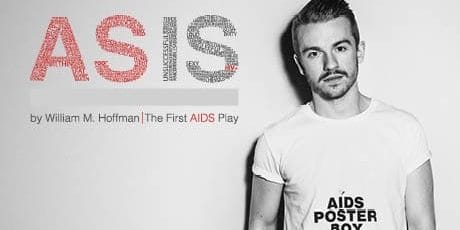
‘As Is’ has one big claim, that it is the ‘first AIDS play’. Some dispute this, but given that it was first performed in New York in 1985, just a few short years after the first diagnosis of AIDS, we think it can probably retain this title with some confidence. The New York outing was Tony nominated for Best New Play, but it would be 2013 before London audiences could see ‘As Is’ at the Finburgh theatre. Now 30 years since its first performance, Andrew Keates has brought it back to the West End at Trafalgar Studios 2.
This isn’t a play you simply go to see, this is a production to be ‘experienced’. Facilitated by the wonderfully intimate Trafalgar Studios 2. The audience are taken along for the ride – practically on stage with the cast. We feel every emotion, fight the gut wrenching unfairness and root whole-heartedly for the protagonist.
Like many productions at Trafalgar Studios 2 the audience seating area becomes part of the action, employing an element of audience participation. Often this feels like doing it for the sake of doing it, yet in this production it seems right, we are all part of this, we are all part of the experience.
‘As Is’ tells the story of a young man (Rich) diagnosed with the new pandemic AIDS. Deserted by his current lover he turns to his ex (Saul) for comfort, and we gradually discover the trials of dealing with a new disease that people really didn’t understand.
In the title role of Rich, Steven Webb gives one of the greatest performances I have ever seen in the West End. Within minutes of the play starting I felt like I had known Rich my whole life, like he was my close friend and his struggle would be my struggle too. Every emotion, thought and feeling was painted on his face and imprinted in his eyes. I found myself sobbing and laughing in almost equal measure as Webb carried the audience with him on his difficult journey, that we all found ourselves willing him on to succeed. Never have I seen such a believable performance that left me in awe of this very talented actor.
David Poynor, in the role of Saul, gave an equally impressive performance. He brilliantly conveyed the absolute and unconditional love Saul has for Rich, and even in the darkest times, did not waiver from his resolute determination to be there, to be the one person that Rich could truly rely on. Again, the audience were spirited along – we were thankful to have Saul with us, in the same way Rich was.
The supporting cast each take on multiple roles, switching between them with skill and ease. At one point I didn’t realise that two particular characters were being played by the same actor
Dino Fetsher, fresh from his TV role in ‘Cucumber’, is particularly adept at this. The most notable of the characters he portrays is the brother of Rich. Early on we see the conflict with his wife, stemming from his brothers diagnosis, which culminates in a beautifully poignant scene between himself and Rich. Fetscher compliments the leads with a superb talent that will surely lead to bigger roles.
Natalie Burt, among her roles, brings us the ‘best friend’ character. She confidently shows us the turmoil she faces when Rich lashes out at the ones he loves the most and her dedication to remain a friend and a source of comfort to him. An accomplished actor and author, Burt brings maturity to a role that could easily have been pushed to the side-lines.
Giles Cooper, Bevan Celestine, Jane Lowe and Russel Morton complete the cast, each bringing a freshness to their various and multiple roles. They provide light relief to counter the daunting subject matter, in particular Jane Lowe in the role of Hospice Worker.
Russel Morton shines in the role of the helpline call handler who, in a barage of clichés, highlights the attitude and misconceptions that existed at the time, and still do to some extent today.
This may be a play about AIDS, but crucially, it’s also a play about love. Steven Webb and David Poynor portray an unconditional love that practically jumps from the stage and wraps around the audience like a warm, comforting and familiar blanket. The words may have come from Hoffman but the performance is all Webb and Poynor and I suspect it was heavily influenced by Director Andrew Keates real life relationship with his own partner, who sat in the audience beaming proudly.

















